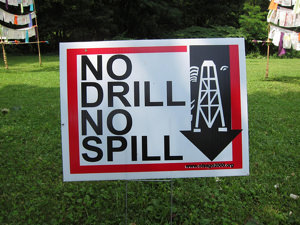The Lowdown on Fracking
Proposed new rules would require oil and gas companies to divulge the kinds and amounts of chemicals used in their underground hydraulic fracturing operations. But environmental and health advocates say drillers could exploit some loopholes.
By Lena Groeger, ProPublicaThis piece originally appeared at ProPublica.
In the process of fracking, or hydraulic fracturing, millions of gallons of highly pressurized water, mixed with sand and other chemicals, are injected into the ground to extract natural gas from rock. As we’ve noted before, some of these chemicals are toxic to humans and have contaminated nearby groundwater. Some energy companies have voluntarily made their chemical information public, but others have fought to keep them secret.
InsideClimate notes that the proposed national rules would specifically require companies to give both the names and concentrations of individual chemicals used. So far, Colorado is the only state that requires such detailed information for all chemicals; eight other states with fracking disclosure rules either do not require companies to report concentrations or only require them to report concentrations of hazardous materials. The BLM’s rules also would compel companies to report the total volume of fracking fluid used, as well as how they intend to recover and dispose of it.
Though the BLM’s proposed rules are more stringent than most state laws, environmental and health advocates say drillers could circumvent some of the requirements. For instance, the rules would only apply to drilling on federal lands. Also, companies could request that certain chemicals be exempted from disclosure if they are deemed a “trade secret.” The trade secret exemptions “could potentially make the rules meaningless if applied broadly,” Dusty Horwitt, senior counsel at a public health advocacy group told InsideClimate.
While the BLM’s proposal states that all the non-exempted information would “become a matter of public record,” it makes no mention of how or where the disclosure information would appear — or how it would be made available to the public.
To compare the BLM’s draft rules with state disclosure provisions, take a look at the table here (which we’ve recreated from a chart by InsideClimate). You can also read the full draft legislation here.
Your support matters…Independent journalism is under threat and overshadowed by heavily funded mainstream media.
You can help level the playing field. Become a member.
Your tax-deductible contribution keeps us digging beneath the headlines to give you thought-provoking, investigative reporting and analysis that unearths what's really happening- without compromise.
Give today to support our courageous, independent journalists.








You need to be a supporter to comment.
There are currently no responses to this article.
Be the first to respond.